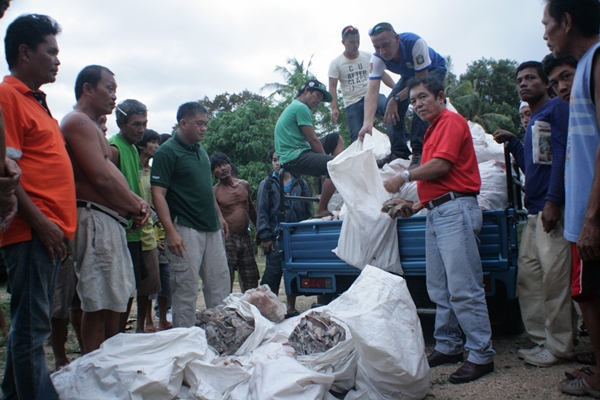
HOT FISH. Cut up pieces of suspected shark meat in sacks for deliverty to Pasil, Cebu City from a plant in Lapu-Lapu city where valuable fins were earlier removed.
The drive against the shark trade scored another apprehension yesterday with the seizure of 1,650 kilos of shark meat in Lapu Lapu City.
The frozen fish meat, cut in pieces and stored in plastic sacks, was loaded in a multicab that was stopped in barngay Bangkal by the Task Force Kalikasan of Lapu-Lapu City.
An Australian businessman later went to the police station and said the cargo was actually the leftovers of “gummy sharks” whose fins were already removed and purchased by his company in barangay Marigondon, Lapu-Lapu City.
He said the multi-cab was heading to Pasil, Cebu City because the remains of the fish were already bought by someone else for about P6,000.
There’s no national law prohibiting the capture and sale of sharks, but a Cebu provincial ordinance bans the killing, trade or transport of thresher sharks and whalesharks.
Orlando Leyson, chairman of the City Fishiries and Aquatic Resources Management Council (CFARMC) was called in by police to identify the fish meat.
Leyson said it was shark meat but that he still had to determine the species.
The vehicle driver Federico Cabido, 48 of barangay Sawang Calero, Cebu City and his helper Adonis Dolores, 21 of Pasil, Cebu City were detained.
Supt. Virgil Ranes of the Lapu-Lapu city police and a member of Task Force Kalikasan said a concerned citizen tipped them off that shark meat was being delivered.
The driver had no permit to transport and said he was just contracted by a certain “Pandak” to deliver the cargo from Marigondon to Pasil.
Supt. Ranes and his team said they are looking deeper into the origin of the shark meat and the Australian’s account of running an export-import business of shark meat, allegedly from Australia.
The seized fish meat is being stored temporarily in the CFARMC office. Samples were taken for laboratory examination.
No shark meat
At the Capitol, two fish ball processing firms denied using shark meat in their products when they met with the Provincial Anti-Illegal Fishing Task Force .
Kim Don, manager of Sea World Exim Trader and Victor Johnson of Sea Master Food Products Co. Inc, went to the Capitol yesterday after being invited by the task force head Loy Madrigal for a dialog.
According to Madrigal, workers’ from both companies had told him that the two seafood plants have long been using shark meat for their products.
Don , however, said they use other fish species such as “barla” or “diwit-diwit” (cutlass fish) which are readily available in the market as well as “fish trimmings and cuttings” from companies in the Mactan Economic Processing Zone (Mepz) that export fish products.
“We use other fish cuttings. Because when fish is exported, they ask for specific cuts. So those left without use, we try to source that out,” Don said yesterday.
Sea World is based in V. Rama Street in Cebu City while Sea Master’s plant is situated in barangay Jugan in Consolacion town.
Asked if he was aware that the transport, hunting and sale of shark meat is prohibited by a 2012 provincial ordinance, Don replied “no.”
“I just came to know (about the ordinance) in the news,” he said.
Madrigal said he invited the business owners to find a “more civilized way” of approaching the problem.
“We don’t want to kill your business. At the same time, we also want to enforce protection for species such as thresher sharks,” he told the two representatives.
“I just wanted them to know that we know. In good faith. I might ask for a search warrant later or I will monitor them. If there’s an arrest, they can’t reason out later that they did not know about the ordinance,” said Madrigal.
Related Stories:
Transport group threaten strike
Cebu strike paralyzes 30 percent of public transport

